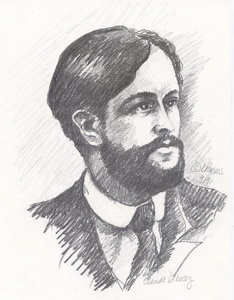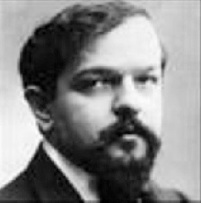1862-1918

Claude Debussy is the composer who is credited with beginning the “Modern Movement” in music. He was a rebel by nature who questioned all authority and who broke and changed many of the "rules" of music. He grew up during the Romantic Period, when music told stories and described things and events in passionate detail. Romantic composer/musicians such as Louis Moreau Gottschalk and Franz Liszt were flamboyant performers who gave birth to the idea of the "super-star" musician. The second half of the nineteenth century was a time when music and the other arts were becoming bigger, bolder, and more individualistic. For a time, Debussy idolized some of the leaders of the Romantic movement and was a devoted follower of Richard Wagner. As he matured into adulthood, though, Debussy’s ideas changed, and he strove to write music that created impressions rather than telling the whole story. Much of his music is very quiet and often abstract (little or no melody in the traditional sense). He wanted the piano to sound as if it had no hammers. He also wanted other musicians to let his music play itself through them rather than imposing their own personalities on the music. Debussy's ideas were new and revolutionary, and his music still sounds very modern. He is considered to be the greatest French composer who ever lived, and one of the greatest composers of the late-19th and early-20th centuries.
Claude Achille Debussy was born on August 22, 1862 above the china shop his parents ran in Saint-Germain-en-Laye on the outskirts of Paris, France. Claude was the first of five children in his family, and received no formal education until he went to the Paris Conservatory. He was a difficult and emotional child, and was known all of his life to be a terrible speller. He had a very large head with a protruding forehead, so his odd appearance and behavior may have started him out in life with a chip on his shoulder.
Claude started piano lessons at the age of seven. After two years, a woman who might have been one of Chopin's students, accepted him as her student. Claude was already showing signs of brilliance, and was accepted at the Paris Conservatoire at the age of ten. He started composing when he was twelve. While they recognized his talent, many of Claude's teachers thought his style was dangerous when they heard him improvise. The boy just wouldn't follow the rules! When asked which rules he did follow, Claude replied, "my pleasure." Those were the rules he was to follow the rest of his life - in music as well as his personal life.
When Claude graduated from the Conservatoire, he became employed as a household musician by Nadezha van Meck (the same woman who supported Tchaikovsky for many years). It was his duty to teach her children to play the piano and to play duets with Madame van Meck. Claude travelled with the family to Italy, Switzerland, and twice to Russia. When he fell in love with with their eldest daughter, he was fired.
After winning several smaller prizes for his music, Debussy was awarded the "Prix de Rome" in 1884 for his composition
L'Enfant Prodigue. The recipients of this award were sent to Rome to study and concentrate on their artistic endeavors. Their expenses were paid by the government for a period of three years. The only thing the artists were required to do was to send back samples of their work from time to time. At the end of the three-year period, they were to perform a concert of their own work. Debussy hated Rome, and left it twice to go to Paris. He ended up spending only two of the three years in Rome, and the since the judges didn't like the music Debussy was sending back, he didn't get his concert.
After leaving Rome in 1887, Debussy lived in Paris with Gabrielle Dupont for the next ten years. No one knows where she came from or what she did for a living, but she supported Debussy and tried to look the other way when he was unfaithful to her. After a bitter argument over one of these affairs, Gabrielle shot herself. She survived, and she and Debussy reunited for a short period, but Debussy married a woman named Rosalie Texier in 1899. The marriage didn't last long, though, and Debussy left Rosalie in 1904 for a married woman, Emma Bardac. Rosalie also shot herself and survived, but Debussy married Emma anyway the following year. Many people thought Debussy married Emma for her money. She was much older than the composer and had several adult children. Emma and Claude had a daughter together named Claude-Emma (nick-named Chouchou), and Claude adored her for the rest of his life.
Debussy wanted to try writing an opera, and spent many years looking for a libretto (the story-line and lyrics of an opera) to work with. He decided to use Maurice Maeterlink's play
Pelleas et Melisande. Debussy was still an unknown composer, but the world-famous playwright agreed to let him set his play to music. The opera took ten years to compose. When Debussy played the finished score for Maeterlinck, his wife had to keep poking him to keep him awake! The opera was not immediately successful, but went on to be fairly popular. It still stands as one of the only musically delicate and subtle operas ever written.
There was very little music that Debussy actually liked. He considered himself to be Chopin's musical equal, but hated Brahms and Tchaikovsky and was bored by Beethoven. He said, "I am more and more convinced that music, by its very nature, is something that cannot be cast into a traditional and fixed form. It is made up of colors and rhythms." This philosophy was similar to that of the Impressionist painters, and Debussy is referred to as an "Impressionist" composer although he disliked the title.
Physically, Debussy was short and plump, pale, and wore a full beard and mustache. When he had money, liked to spend it on fine clothes and fancy foods. He was always touchy and defensive, and hated being around people he didn't know. He also hated conducting orchestras and playing the piano in public, and was rarely without one of his Siamese cats. Additionally, he was a chain-smoker who adored the writings of Edgar Allan Poe.
In 1909, Debussy's health began to fail. He had two operations for cancer, and suffered a great deal of pain in his last years. The outbreak of World War I took a tremendous emotional toll on Debussy that often left him unable to compose. In 1917, he said that the music had left him. By 1918, Debussy was confined to his room, where he died on March 25. His daughter, Chouchou wrote that he looked "happy, oh so happy!"
Debussy's piano music ranges from the very beautiful and elegant ("Clair de Lune" and "Reverie") to the more abstract and dissonant. Some of his other well-known works include "Pour le Piano," a book of Preludes, "Two Arabesques," "Suite Bergamasque," and "The Children's Corner." He even did some experimenting with ragtime in "Golliwog's Cakewalk."


